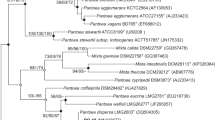Abstract
BACTERIAL soft rot of vegetables and the retting of flax are both due to decomposition of the pectin complex in the middle lamella, in the former case resulting in a loss of cohesion between the cells of the vegetable in the area invaded by the causal organism, and in the latter case resulting in a dissolution of the layer which binds the fibre bundles to the remainder of the cortex. It seems likely, therefore, that some bacteria may be furnished with the necessary enzymes to enable them to bring about both these changes.
This is a preview of subscription content, access via your institution
Access options
Subscribe to this journal
Receive 51 print issues and online access
$199.00 per year
only $3.90 per issue
Buy this article
- Purchase on Springer Link
- Instant access to full article PDF
Prices may be subject to local taxes which are calculated during checkout
Similar content being viewed by others
References
Ruschmann, F., J. Text. Inst., 15, T61 and 104 (1924).
Dox, A. W., U.S. Dept. Agric. Bur. Anim. Ind., Bull. 120 (1910).
Dowson, W. J., NATURE, 152, 331 (1943).
Author information
Authors and Affiliations
Rights and permissions
About this article
Cite this article
ALLEN, L. Spore-forming Bacteria causing Soft Rot of Potato and Retting of Flax. Nature 153, 224–225 (1944). https://doi.org/10.1038/153224a0
Issue Date:
DOI: https://doi.org/10.1038/153224a0
This article is cited by
-
MICROBIOLOGY OF RETTING
Nature (1946)
Comments
By submitting a comment you agree to abide by our Terms and Community Guidelines. If you find something abusive or that does not comply with our terms or guidelines please flag it as inappropriate.



